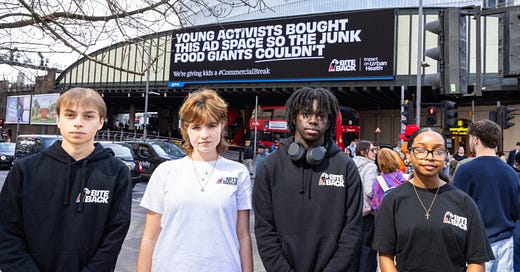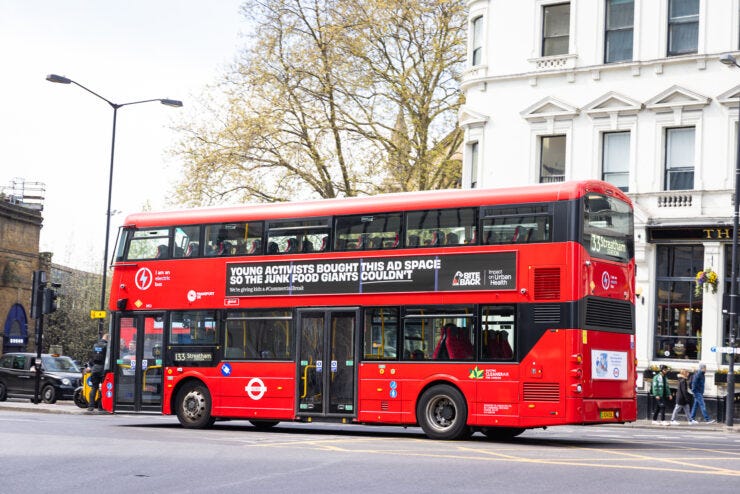London teenagers have got so sick of seeing adverts for quarter-pounders that they have bought up hundreds of ad spaces to prevent ‘Big Food’ from using them. They have even bought ad spaces on buses which ‘junk food giants’ cannot, in fact, use because they are part of TfL.
Remarkably, these young people have paid for 365 adverts in Lambeth and Southwark, not an area known for high disposable incomes. Or have they? You will notice two logos on the ads.
The first is Bite Back 2030 which describes itself as a ‘youth activist movement’. It certainly has lots of photos of young people on its website, but it is run by a bunch of middle-aged third sector professionals. It was founded by the multi-millionaire former restaurateur Jamie Oliver after he’d successfully campaigned for the sugar tax. In 2023, it had a turnover of £2.5 million and its CEO was paid between £130,000 and £140,000. It does not seem to rely on donations from concerned citizens. On the contrary, it says: ‘Fundraising is through applications to grants, trusts, corporates and other organisations’. In 2023, these donors included Bloomberg Philanthropies and the Rothschild Foundation. Other ‘partners’ listed on its website include the Jamie Oliver Group, the AKO Foundation, the Oak Foundation, the Jochnick Foundation, the Esmee Fairburn, the Bane Foundation and UNICEF. In their latest accounts, they say that ‘we plan to reduce our reliance on Jamie Oliver Group’s in-kind support’.
None of this has the vibe of a grassroots movement staying afloat with the generous support of the general public, let alone through donations from impecunious inner city teenagers. Unusually for a charity, there is nowhere on its website for people to donate even if they wanted to.
The other name on the adverts that ‘young activists’ have supposedly bought is Impact on Urban Health. This organisation is part of Guy’s & St Thomas’ Foundation, a vast NGO with a turnover of £34 million and 147 employees, 17 of whom earn more than £100,000. Its best paid member of staff - presumably the CEO - received over £400,000 last year. Most of its money comes from its property and investment portfolio, although it also gets a few quid from the Greater London Authority and the National Lottery. It spent £18.8 million on Impact on Urban Health in 2023/24.
It is possible that young people feel so strongly about fast food adverts that they make voluntary donations to a fabulously wealthy foundation, but it doesn’t seem very likely (neither Impact on Urban Health nor Guy’s and St Thomas’s Foundation have a donate button on their websites). It seems more likely that two multi-million pound activist NGOs have dipped into their slush funds to buy some expensive advertisements and then got a few teenagers to stand in front of them.
If so, the claim that ‘young activists bought this ad space’ would seem to breach the Advertising Standards Authority’s requirement that advertisements be ‘honest’ and ‘truthful’, wouldn’t it?






Laughing at them spending on adverts on the side of buses where junk food adverts can't be shown anyway. Protesting to stop what is already stopped.
Needs a formal complaint to the Charity Commission. Fake charity. So much of that money could actually help someone, rather than line the pockets of wealthy CEOs.